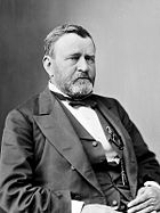
(1869–1877) as well as military commander during the Civil War
and post-war Reconstruction periods. Under Grant's command, the Union Army
defeated the Confederate military
and ended the Confederate States of America
. Grant began his lifelong career as a soldier after graduating from the United States Military Academy at West Point
in 1843. Fighting in the Mexican–American War
, he was a close observer of the techniques of Generals Zachary Taylor
and Winfield Scott
.
1861 American Civil War: Forces under Union General Ulysses S. Grant bloodlessly capture Paducah, Kentucky, which gives the Union control of the mouth of the Tennessee River.
1861 American Civil War: Battle of Belmont: In Belmont, Missouri, Union forces led by General Ulysses S. Grant overrun a Confederate camp but are forced to retreat when Confederate reinforcements arrive.
1862 American Civil War: Ulysses S. Grant gives the United States its first victory of the war, by capturing Fort Henry, Tennessee, known as the Battle of Fort Henry.
1862 American Civil War: General Ulysses S. Grant attacks Fort Donelson, Tennessee.
1862 American Civil War: General Ulysses S. Grant captures Fort Donelson, Tennessee.
1862 American Civil War: The Battle of Shiloh begins – in Tennessee, forces under Union General Ulysses S. Grant meet Confederate troops led by General Albert Sidney Johnston.
1862 American Civil War: Battle of Shiloh ends – the Union Army under General Ulysses S. Grant defeats the Confederates near Shiloh, Tennessee.
1862 American Civil War: General Ulysses S. Grant issues ''General Order No. 11'', expelling Jews from Tennessee, Mississippi, and Kentucky.
1863 American Civil War: Battle of Chattanooga begins – Union forces led by General Ulysses S. Grant reinforce troops at Chattanooga, Tennessee and counter-attack Confederate troops.
1864 American Civil War: The Army of the Potomac, under General Ulysses S. Grant, breaks off from the Battle of the Wilderness and moves southwards.
The art of war is simple enough. Find out where your enemy is. Get at him as soon as you can. Strike him as hard as you can, and keep moving on.![]()
No terms except an unconditional and immediate surrender can be accepted. I propose to move immediately upon your works.![]()
God gave us Lincoln and Liberty, let us fight for both.![]()
I propose to fight it out on this line, if it takes all summer.![]()
Wherever the enemy goes let our troops go also.![]()
The war is over — the rebels are our countrymen again.![]()
Reports of my death greatly exaggerated. Returning to Washington immediately.![]()

